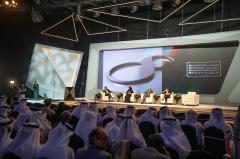Global Experts Stress Authenticity As Key To Govt Communication; Primary Tool For Behavioural Change
International Government Communication Forum’s first session, Human Behaviour: New Dimensions for Change Communication, explored the role of government campaigns in motivating individuals to make effective change in society. The session featured Dr Lamya Nawaf Fawwaz, Masdar’s Executive Director of Brand and Strategic Initiatives, Roger Fisk, head of the political campaign, marketing, and media strategies for President Barack Obama, and Andrew Keen, eminent author and keynote speaker who specialises in the impact of new technology on the 21st century business, education, culture and society. Andrew Wilson, TV news anchor and foreign correspondent, acted as moderator.
Kickstarting the session, moderator Andrew Wilson highlighted the key role that all governments should ideally play in effective communication, namely to positively influence behaviour for the betterment of society.
Role of new technology in communications
Covering the transformation of government campaigns over the decades, Roger Fisk emphasised that the proliferation of technology and applications have transformed, and continue to transform the government communication landscape. “The most important thing for governments to ensure is that their communication campaigns benefit societies and help their institutions function better,” he said.
“In the past, we did not have the technological tools to help us gather data during a campaign. Today we do, and these tools provide answers on what makes people form a decision. This helps campaigns to micro-target particular segments of society and understand how people make a decision,” added Fisk who is credited with the success of President Obama’s electoral and media campaigns.
On the topic of audience targeting, Fisk added that peer-to-peer communication proves highly effective. “When I do a campaign, I look at who I want to reach, and then I get a person from that segment of society to take part in the campaign. This allows the message to resonate more, with the receiver more likely to trust the message and act on it because it is coming from someone who lives a similar life to them. In the Obama campaign, we had teachers reaching out to teachers. Veterans reaching out to veterans. This was very effective,” he said.
Fisk, however, emphasised that it was critical that governments and businesses not focus only on social media and applications as communications tools. “Many people still get their news from TV, radio and the newspaper, and from the people in their lives. Sometimes we don’t settle on something until we’ve bounced it off the people that we see every day. There is still a role for traditional media and how we are influenced by the people in our lives. The most critical thing though is that communication is honest and based on real actions. If your communication is based on a foundation of trust and authenticity, then you can take your clients, readers, and citizens on a journey that spans twenty to thirty years.”
Honesty critical to communication
Dr Lamya Nawaf Fawwaz, Masdar’s Executive Director of Brand and Strategic Initiatives agreed with the US expert, acknowledging that “it’s extremely important for governments to recognise honest communications as a critical function in sending out new policies, campaigns and strategic information, with all of the above being created in tandem with effective communications strategies. To create these strategies and messages, we must understand how people absorb and understand information. Through digital platforms and technological advancements we can now more effectively gather and analyse data, applying these with behavioural science to create more effective communication strategies that ensure that our messages are reaching people and influencing them.”
Emphasising the importance of behavioural science in communications, Dr Fawwaz added: “We know from behavioural science that people need to be motivated to behave a certain way. We know that people are more informed now than they’ve ever been, so emotive messaging is more effective in encouraging people to change their behaviour. People are also very influenced by role models. The UAE is unique in that we look up to our leadership and trust them. That’s thanks to the open and consistent communication, by our leaders. When people see those they look up to communicating openly, they are more likely to get behind their message and carry it forward.”
How will governments use data?
Data was also widely discussed during the session, with Andrew Keen saying: “Data won’t come only from smartphones in the future. In fact, I think smartphones will become archaic. In the future, individuals will be spewing data from their homes, cars, bodies and more. The great opportunity and challenge is what governments are going to do with that data. Are they going to use it responsibly? Will they use it oppressively? Will they allow it to confuse them? In the 21st century, governments will know more about their citizens than in the whole of history. Today, most citizens don’t trust their governments. There is so more data, but less trust. This paradox needs to be addressed.”
Artificial intelligence (AI) and the role of humans in both communication and other areas was also covered by the debate. “The great challenge and opportunity of the 21st century is realising human potential again. We’ve created technology that replicates and mimics human beings, with AI doing much of what we do, from serving burgers to analysing medical data to building bridges to teaching in schools. With this in mind, the role of the government becomes doubly important. Its purpose becomes to empower humans in this sea of smart technology and figure out what people will do in a future where machines are likely to do most of what we’ve done historically.”
UAE role model in government communication
Dr Fawwaz argued that while technology is fast changing, it is important to acknowledge that government communication is a long-term strategy. “The UAE can be seen as an example for the region. We see that the UAE has the most effective here in terms of government-citizen communication. The government is confident in the direction its moving and it’s communicating that honestly with its people. For example, The Year of Tolerance is not just a themed year, it’s a communications event that is carried through various actions. The recent visit of the Pope, for instance, and hosting of the Special Olympics, are all examples of events that tie into that event.”







